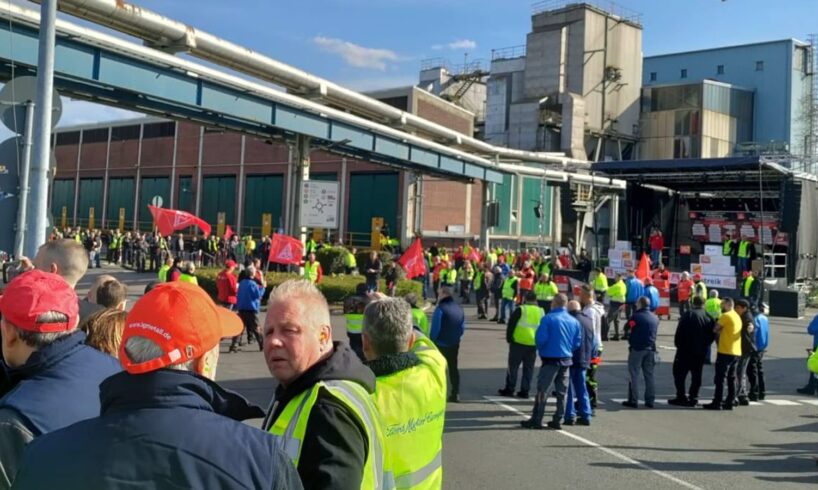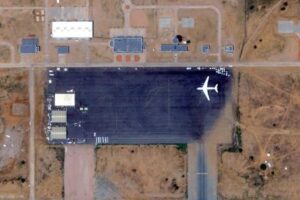
Warning strike at Ford Cologne on 2 April 2025
Ford’s Cologne plant faces a slow death. Two weeks ago, the IG Metall union and works council pushed through the elimination of 2,900 jobs there. Last Tuesday, the company informed the workforce that from January 2026, production would be cut from two shifts to just one. As a result, a further 1,000 jobs are to be shed this year.
At a works meeting, management cited poor sales of its electric Capri and Explorer models, which are built in Cologne, as the reason for switching to single-shift operation. The company had invested €2 billion in converting the plant to e-mobility. While the IG Metall and works council helped to wind up the Ford plant in Saarlouis, the investment in Cologne and the supposed “secure future” of the plant were supposed to keep the workforce there quiet.
Now the entire site is under threat. The works council, led by IG Metall, announced “negotiations” with management to work out the terms and mechanisms of the latest round of cuts. In recent years, IG Metall and the works council have drawn up one job-cutting programme after another. Each time they claimed this would “safeguard Ford’s competitiveness” and survival in Germany—until the next round. Of what were once over 20,000 employees in Cologne, around 11,500 remain. With the cuts just announced, this is soon to fall to only 7,000. Every agreement concluded by the works council and IG Metall brings the plant closure a step closer.
After thousands of production jobs in Cologne were eliminated up to 2019, subsequent waves of rationalisation and downsizing primarily targeted jobs in administration as well as research and development. Now production is back in the firing line. This carving up of the workforce is entirely in the interests of IG Metall and the works council officials. At the beginning of this month they pushed through a “social contract” that cost 2,900 employees in areas other than production their jobs.
Because 660 jobs from the preceding round of cuts could not be eliminated via “voluntary” severance or retirement, IG Metall and the works council have now explicitly left the door open for compulsory redundancies. A perfidious three-stage process is to be used to drive workers out of the plant. Anyone who rejects the first severance offer receives a second, lower one—only 75 percent of the first. Anyone who rejects that as well will be made compulsorily redundant.
“These perfidious Mafia-like methods are designed to divide the workforce,” we wrote in our statement against the “social contract.” We also warned about the reduction to single-shift operation. The “overall solution” touted by IG Metall and the works council is the basis for the gradual shutdown of the plant. “Only recently, management announced that the second shift at the plant would be abolished. One-shift operation will then be used to justify the next round of job massacres, since it is unprofitable from the corporation’s point of view.”
It is hard to avoid the conclusion that Ford in the United States decided long ago to largely withdraw from production in Europe. The “America First” policy of President Donald Trump will dispel any remaining doubts about that decision—if there were any at all.
Ford has already closed or sold numerous plants in Europe over the past 12 years: in the UK—Southampton, 2013, and Bridgend, 2019; Belgium—Genk, 2014; France—Blanquefort, 2019; Slovakia—Kechnec, 2019 and Russia—Naberezhnye Chelny, St. Petersburg and Yelabuga, 2019 to 2022. Production of the Focus in Saarlouis ends in two months; 1,000 jobs will remain there at most until 2032. The future of Ford’s plant in Almussafes (Valencia), Spain—which “won” the internal bidding war against Saarlouis—is also uncertain. At present only the Kuga model is produced there; the start of production for new electric or hybrid models has been postponed from 2025 to 2027. Of the plant’s 9,300 employees three years ago, fewer than a third remain.
In Turkey and Romania, Ford has spun off vehicle production into the joint venture Ford Otosan with the Turkish industrial group Koç Holding. Each holds a 41 percent stake. Ford Otosan builds the transporter models at four plants in Turkey. At the Craiova plant (Romania), internal combustion and electric versions of the Puma are also built.
Wages in Craiova are less than one-third of those in Germany and Spain; in Turkey they are lower still. It is obvious that jobs in Cologne or Almussafes can only be defended if the European workforces unite and then reach out to their colleagues in the United States and worldwide.
But the officials of IG Metall and the works council have no intention of doing that. “The Ford site in Cologne needs a new concept,” said shop steward leader David Lüdtke to broadcaster WDR. The e-models were good cars, he said, but simply too expensive for the market.
The first costs Ford will cut to build cars more cheaply are labour costs. A “new concept” for cars that only a few can afford therefore means a “cost-saving concept.” The works council will develop one and present it to management in the upcoming negotiations. As Lüdtke put it, the works council must decide “with which demands we enter these negotiations.” From the outset, IG Metall has ruled out defending jobs.
Yet at the beginning of the year, the Cologne workforce proved it wanted to fight for their jobs. Over 93 percent of members voted in favour of a strike. But IG Metall—having reluctantly organised the strike ballot in response to demands from the workforce—called off the strike after just 24 hours in order to enter so-called negotiations with management, in which the notorious “social contract” was then drawn up.
In the subsequent ballot, IG Metall called on its members to rubber-stamp the elimination of a further 2,900 jobs and not to resume the strike. “Unfortunately, a viable future strategy cannot be forced through a strike,” claimed Lüdtke.
“A transfer of operations, or even the closure of entire areas, cannot be prevented by strikes,” added IG Metall’s lead representative for Cologne/Leverkusen, Kerstin Klein, warning against rejecting the “social contract”: “Renegotiating individual points is out of the question. Further negotiations and strikes could therefore ultimately lead to significantly worse conditions.”
The IG Metall and works council had their members vote on an agreement, the terms of which were withheld from them and where most of the details have not even been fixed but will continue to be coordinated by the union with management. When IG Metall obtained the 93.5 percent approval it sought for the “social contract”, it crowed: “A safety net for everyone!” The “safety net” did not even last two weeks.
It could hardly be clearer: The jobs and the entire plant—which provides the livelihood for many thousands of people—can only be defended against the IG Metall apparatus and its works council representatives. Their mandate for any further negotiation must be withdrawn. All the details of the “social contract” and all its sub-agreements must be disclosed. On this basis, workers who truly want to fight must organise independently in the rank-and-file Ford Action Committee.
Ford is an international corporation with 171,000 workers in plants on four continents. They must be contacted—in Germany, in Europe and worldwide. The same applies to colleagues at other companies in the automotive, supplier and steel industries, and so on, who face the same problems.
Such an international strategy and cooperation are necessary to resist the blackmail by management and the works council. It is a perspective that proceeds from the common interests of all working people worldwide and runs counter to the logic of the capitalist profit system, which the union and works council officials defend tooth and nail.
Send us a WhatsApp message on the following number: +49 163 337 8340 and fill out the form below to get active now.
Stay informed. Sign up to our Autoworker Newsletter.





